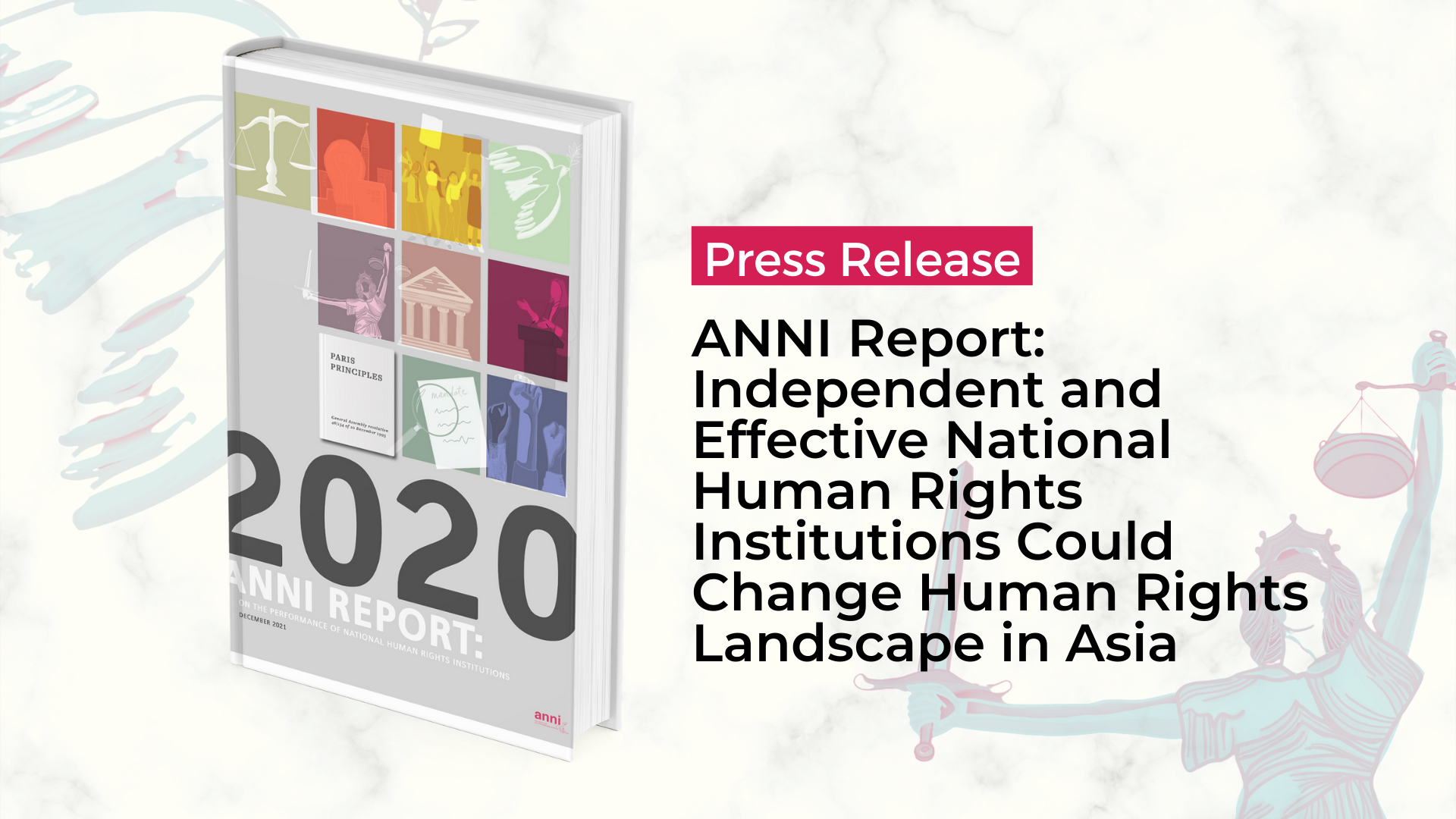ANNI Report: Independent and Effective National Human Rights Institutions Could Change Human Rights Landscape in Asia
- The human rights situation in 11 Asian countries continued to deteriorate in the face of the COVID-19 pandemic. Civic spaces continued to shrink, and human rights defenders persisted to work in precarious conditions with minimal protection.
- Draconian laws and enactment of repressive legislations increased across several Asian countries, under the pretext of COVID-19.
- Throughout the pandemic, many National Human Rights Institutions (NHRIs) in Asia failed to adequately address the impact of COVID-19 on human rights or hold their respective governments accountable for the human rights violations resulting from COVID-19 responses.
- NHRIs in Asia faced immense challenges as their independence has been weakened under increasingly authoritarian governments, financial and human resources have been restricted, and work has been impeded by political instability, resulting in failure to comply with the Paris Principles ‒ the international minimum standards for effective and credible NHRIs.
***
The Asian NGO Network on National Human Rights Institutions (ANNI) launched the ANNI Report 2020 on the Performance of National Human Rights Institutions (NHRIs), that critically assesses the performance of NHRIs against the Paris Principles in 2020.
The Paris Principles are the minimum international standards for ensuring independent, effective, and credible NHRIs for the promotion and protection of human rights.
The report was led by local civil society organisations and covers 11 Asian countries ‒ Bangladesh, India, Indonesia, Malaysia, Myanmar, Nepal, Pakistan, South Korea, Sri Lanka, Taiwan and Thailand.
The ANNI report reveals that in 2020, most NHRIs were unable to perform their mandates effectively. Their independence has been compromised due to repressive laws, and governments have often excluded NHRIs when developing COVID-19 responses.
In the case of Sri Lanka, the 20th constitutional amendment grossly undermined the credibility of the country’s NHRI, raising questions on its compliance to international standards. In Pakistan, the NHRI has remained non-functional since May 2019 due to the lack of political willingness of the government to appoint new commissioners. Additionally, the report finds that the Myanmar National Human Rights Commission has become complicit in towering human rights violations, especially those committed by the State.
Most NHRIs from the 11 countries also found it challenging to adjust to an unprecedented situation caused and exacerbated by the COVID-19 pandemic.
‘If fully compliant with the Paris Principles, NHRIs can drive systemic change, given their unique position as institutions and their mandate to promote and protect human rights in the country,’ said Shamini Darshni Kaliemuthu, Executive Director of the Asian Forum for Human Rights and Development (FORUM-ASIA).
Ongoing Advocacy on NHRIs
ANNI also finds that some NHRIs have managed to continuously advocate for the betterment of human rights situation in-country, such as the through investigating of cases of human rights violations in South Korea; being involved in advocating against discriminatory legislations in Sri Lanka; and conducting needs assessments for the most vulnerable groups affected by COVID-19 in Malaysia.
However, there is still a long way to go for Asian NHRIs in terms of ensuring human rights principles in the post-pandemic recovery measures; defending civic space under increasingly authoritarian regimes; meaningfully engaging with civil society organisations, diverse communities, and stakeholders; and having financial autonomy and mandate guaranteed by legislation to function independently
‘We urge NHRIs in Asia to take immediate steps to fully comply with the Paris Principles and to ensure that human rights are protected for all, especially for those who are at high risk and the most vulnerable,’ said Shamini.
The ANNI Report 2020 on the Performance of National Human Rights Institutions is a biennial report developed by ANNI to critically assess the performance of NHRIs in Asia based on the civil society organisations’ perspectives, for the purpose of strengthening the work and functioning of NHRIs. The full report is available on the ANNI website.
‒ END ‒
About ANNI
The Asian NGO Network on National Human Rights Institutions (ANNI) was established in December 2006 as a network working on issues related to National Human Rights Institutions (NHRIs). ANNI has members whose work focuses on strengthening the work and functioning of Asian NHRIs to better promote and protect human rights, as well as to advocate for their improved compliance with international standards, including the Paris Principles and General Observations of the Sub-Committee on Accreditation (SCA) of the Global Alliance of NHRIs (GANHRI). The Asian Forum for Human Rights and Development (FORUM-ASIA) has served as the Secretariat of ANNI since its establishment. http://l.forum-asia.org/ANNI
For media inquiries, please contact:
- Melissa Ananthraj, Communication and Media Programme, FORUM-ASIA, [email protected]
For further information, please contact:
- National Human Rights Institutions Programme, FORUM-ASIA, [email protected]




